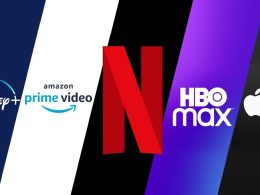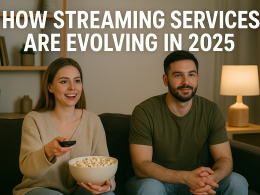Introduction
The advent of 5G technology is revolutionizing various industries, especially media and entertainment. With faster speeds, lower latency, and higher bandwidth, 5G enables seamless streaming, immersive experiences, and advanced interactivity. This article delves into the profound effects of 5G on the media and entertainment landscape, highlighting its potential to transform content creation, delivery, and consumption.
The Rise of 5G in Media and Entertainment
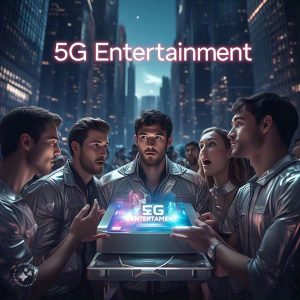
5G is the latest and fastest mobile network technology. It is changing how we create, share, and enjoy entertainment. With its high speed and better connection, 5G is opening new doors for streaming, gaming, and virtual experiences. This rise of 5G marks a big step forward in the media world.
How 5G Improves Content Streaming

1. Lightning-Fast Downloads and Buffer-Free Streaming
5G offers download speeds up to 100 times faster than 4G, enabling instant access to high-definition (HD) and 4K content. Viewers can enjoy uninterrupted streaming experiences, even in crowded areas like sports arenas or concerts.
2. Enabling Interactive Live Streaming
Live streaming with 5G eliminates delays, providing a real-time experience for users. This is particularly beneficial for events like live sports, virtual concerts, and interactive TV shows, where even a second of lag can disrupt engagement.
5G’s Role in Immersive Technologies
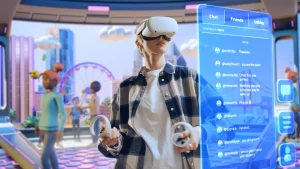
5G is helping new technologies like VR, AR, and cloud gaming grow. It also allows content creators to work together from anywhere using fast file transfers. With 5G, live-streaming events feel more real, and people can interact with content like never before.
1. Virtual Reality (VR) and Augmented Reality (AR)
5G supports the high data requirements of VR and AR applications. Users can engage with hyper-realistic gaming, virtual tours, or AR-enhanced movies without lag, creating more immersive entertainment experiences.
2. Enhanced Gaming Experiences
The gaming industry benefits greatly from 5G, with cloud gaming becoming mainstream. Gamers no longer need expensive hardware; they can stream games directly to their devices with minimal latency.
5G and Faster Streaming

One of the biggest advantages of 5G is its ability to stream content at high speeds. With 5G, you can watch videos in 4K or even 8K without buffering or lag. Whether you’re watching movies, TV shows, or live sports, the experience will be smoother and more enjoyable. This speed is a game-changer for users who want high-quality content instantly, even when they’re on the go.
Cloud Gaming and 5G

Cloud gaming is another area where 5G is making a big difference. Instead of needing a powerful gaming console or PC, players can stream games directly to their devices with little delay. 5G’s high-speed connection makes it possible to play high-end games anywhere without worrying about lag. This is especially exciting for gamers who want a smooth and responsive gaming experience on their phones or tablets.
Transforming Media Production

1. Remote Collaboration in Content Creation
5G enables high-speed transfer of large media files, facilitating remote collaboration among teams in real-time. Directors, editors, and designers can work together from different locations without compromising quality.
2. Revolutionizing News and Journalism
5G enhances live reporting capabilities. Journalists can stream high-quality video from remote locations, ensuring faster and more accurate news dissemination.
Impact on Advertising and Marketing

1. Personalized Advertising Through 5G
The low latency and high speed of 5G allow advertisers to deliver real-time, targeted ads tailored to user preferences. This creates opportunities for interactive and location-based advertising.
2. AI-Driven Marketing Strategies
With 5G, AI can analyze consumer behavior more efficiently, enabling dynamic and personalized marketing campaigns across media platforms.
5G and Better Quality Content

5G’s high bandwidth allows for better quality content. For example, you can stream ultra-high-definition (UHD) videos with much sharper images and clearer sound. The increased capacity of 5G means content creators can deliver richer, more detailed media experiences. Whether it’s a nature documentary or a video game, 5G makes sure the quality is top-notch, giving users the best possible viewing experience.
The Impact of 5G on Education and Training

While entertainment is a big focus of 5G, it also impacts education and training. With 5G’s fast speeds, students can access educational videos, virtual classrooms, and interactive lessons without buffering or delays. For example, VR and AR can be used for virtual field trips or hands-on learning experiences that feel just like real life. This opens up new ways for people to learn and gain skills, making education more accessible and fun.
Enhanced Sports and Live Events with 5G

Live sports broadcasts and events will see a major upgrade thanks to 5G. The fast connection speeds allow for multiple camera angles and live highlights to be delivered without any delay. Fans watching at home can enjoy a stadium-like experience with instant replays, player stats, and other live features. It also opens up the possibility of watching live events in virtual reality, making you feel like you’re right there, even if you’re miles away.
The Role of 5G in Music and Concerts

5G is also transforming the way we enjoy music and concerts. With faster speeds, streaming platforms can offer high-quality audio that sounds just like the live performance. Fans can even experience virtual concerts with 3D visuals or participate in real-time interactions, like voting for the next song or chatting with artists. 5G’s quick connections help bring these music experiences to life in new and exciting ways.
Challenges and Concerns
While 5G is amazing, it also comes with challenges. Building 5G networks is costly, especially in rural areas. This could leave some places behind. Privacy is another concern because 5G devices collect a lot of user data, raising fears about security and misuse.
1. Infrastructure Costs
Deploying 5G infrastructure is expensive and requires significant investment, especially in rural or remote areas. This could create a digital divide in access to advanced media services.
2. Privacy and Data Security
As 5G-enabled devices collect more data, concerns about user privacy and data breaches increase. Companies must address these issues to gain user trust.
The Future of 5G in Media
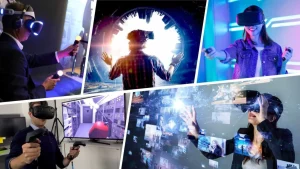
The future of 5G in media and entertainment is bright. It will make content more interactive and personalized while supporting creative ways to enjoy media. As 5G becomes more widely available, it will help shape the next chapter of entertainment for everyone.
How 5G Will Shape Future Innovations in Entertainment
5G’s impact on media and entertainment is just the beginning. As technology continues to evolve, 5G will support even more advanced innovations, like holographic television, fully immersive VR worlds, and instant interactive experiences. These new possibilities will make the future of entertainment more exciting, creating new ways for people to enjoy content, engage with others, and experience media like never before.
Analysis Table: Key Benefits of 5G in Media and Entertainment
| Category | Impact of 5G | Example |
|---|---|---|
| Streaming | Faster speeds and reduced latency | 4K video streaming without buffering |
| Gaming | Low-latency gaming enabling real-time experiences | Cloud gaming platforms like Google Stadia |
| Immersive Tech | Enhanced support for VR and AR applications | Virtual concerts and immersive storytelling |
| Advertising | Real-time, personalized ad delivery | Location-based promotions via mobile devices |
| Media Production | Remote collaboration and efficient file sharing | Real-time editing of high-definition content |
Comparative Table: 4G vs. 5G in Media and Entertainment
| Feature | 4G | 5G |
|---|---|---|
| Speed | Slower, limited to HD streaming | Ultra-fast, supports 4K and 8K streaming |
| Latency | Higher, causing delays in live events | Low latency for real-time experiences |
| Bandwidth | Limited | High, supports more simultaneous users |
| Applications | Basic streaming and gaming | Advanced AR/VR and cloud gaming |
| Interactivity | Limited | Enhanced with real-time engagement |
Conclusion
5G is more than just a faster network; it’s a game-changer for media and entertainment. By enabling high-quality streaming, immersive experiences, and advanced production techniques, it sets the stage for unprecedented creativity and engagement. While challenges like infrastructure and privacy must be addressed, the potential benefits make 5G a cornerstone of the industry’s future.








